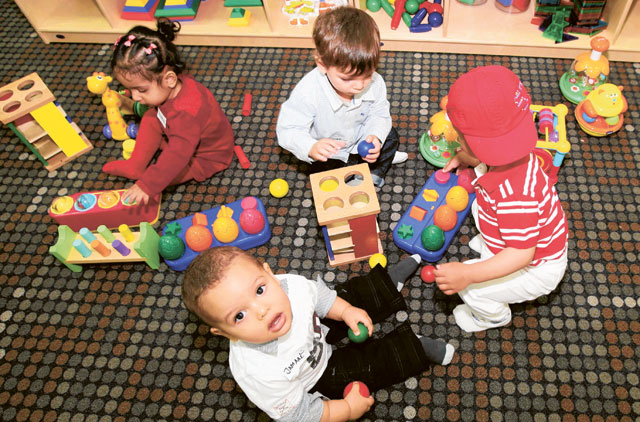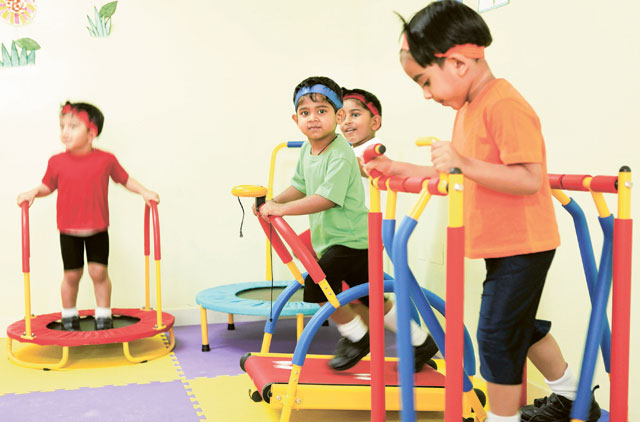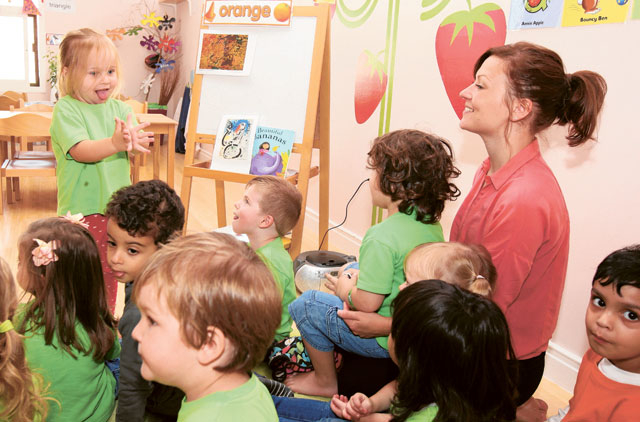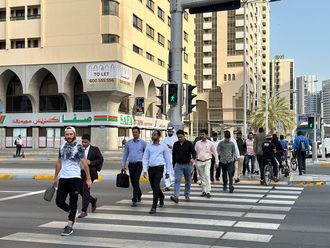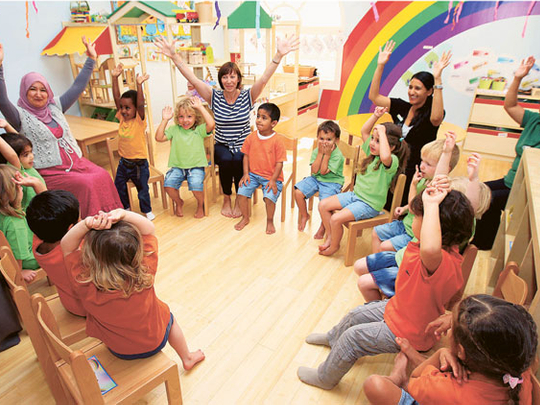
Childhood is often thought of as a simpler time, but any parent who has faced the dilemma of preschool will know that even the first year of their child's life can be encumbered with the kind of competitiveness expected in Ivy League university applications.
Beyond the initial decision to send a child to preschool — which is often less a decision, more a necessity — come the questions "which one" and "how on earth does one get a place there?"
"Being a working mother, I had no choice but to put my child in a nursery," says Mahbooba Haider, a manager at Symsoft AB MEA. "Once I got the type of nursery that best suited me, I had to go through a lot, as they didn't have a vacant seat for my child. I had to follow up for at least a month and convince them that I was really desperate."
"Gaining admission into a good early-education facility is a worldwide problem, not just in Dubai," says Monica Malhotra, managing director at early childhood development centre Kidville. "It's a matter of supply and demand. There is always going to be high demand for good programmes."
Best for both parent and child
For many parents, preschool is an important first step on the education ladder. Homemaker Angelique Michel is a stay-at-home mum who wanted her child to attend a nursery, knowing it's best for both her and her daughter. "Coming from Europe, it's quite common. It is also very healthy and equally important for mother and child to get some time on their own," says Michel, who sent her daughter to a nursery when she was 11 months old.
"Many stay-at-home mothers and fathers are choosing to send their children to preschool for a few mornings a week, as they feel it gives them opportunities to learn social skills, gain more knowledge and understanding about the world, and enriches their minds," says Lucy Bruce, founder and director of education at Home Grown, the UAE's first eco-nursery. Nursery education makes kids "confident, independent and extremely aware of things around them", says Vidya Prakash, headmistress at Happy Kids Nursery.
Staffed by qualified professionals adept at handling emotional and medical emergencies, many parents simply prefer early-educational facilities because they're safe. "For working mothers, nurseries are a better option than keeping the baby with a maid at home, where you constantly worry about how the baby is being dealt with while you are away," Haider says. Also, "it helps toddlers re-channel their energy into fun learning games, and fussy eaters tend to eat better in the presence of other children," Michel says.
In the first five years of a child's life, brain development is at its peak. Exposing children to a stimulating environment hones mental growth and social development. "Preschool education provides a structured environment for learning. This structure is important for children, and historically has been part of every child's early experiences in some form, whether through a social group or religious affiliation," explains Devika Singh, a psychologist and learning enrichment specialist at Dubai Herbal and Treatment Centre. Toddlers begin vocalising their needs when they are about 2 years old. As speech develops, curiosity kicks in. Children start to display a strong interest in exploring and interacting with others. "It is during this phase that a child requires adequate stimulation, proper guidance and nutrition to reach his or her full potential and become a productive part of a rapidly changing environment," says Hiba Abdul Jabbar, early childhood development specialist at Kidville, a centre dedicated to offering fun age-appropriate classes for children. But age should not be the only criterion in gauging a child's ability to handle the preschool experience. "Preschool readiness has to be assessed on an individual basis," Singh says. "Some children show readiness by 18 months, others at 4 years. Often there is some trial and error in finding the right developmental window to introduce preschool."
By the time they are 4, little ones take their first step towards "big" school and enter kindergarten. "The goal of joining a preschool is to start preparing the young ones for school," says Rachana Sippy, secondary school counsellor at Dubai International Academy. She believes the experience should enrich the child mentally, socially, emotionally, behaviourally and physically.
"Children who have not attended an active learning programme may be more attached to their caregivers and less independent. The transition to KG may be tougher for them, as they are not used to following routine and directions from people other than their caregivers," Jabbar adds.
Nonetheless, some parents prefer to individually facilitate learning within the home environment. Is attending a nursery imperative in getting young children ready for school, and does it affect school performance later? "A child who has stayed at home can do just as well as one who has been at nursery when entering school for the first time. But those who have attended nursery may settle more quickly into routine or be more familiar with instructions," Bruce says, adding that at the time of admission, most schools usually assess a child to determine whether they have reached the expected milestones for their age range. "Whether a child has attended a nursery or not shouldn't affect the educator's final decision to accept a child in school."
In a city with so many choices, the selection of a preschool facility often boils down to the parents' financial abilities. "My budget was about Dh2,500 a month," Haider says. "I prefer not to cross it. Most preschools in Dubai are so very expensive, they exaggerate their charges and don't give much in return."
"We cannot compare ‘Dubai rates' with any other place," Michel says. "As a tax-free country, services and school can be quite expensive here."
Nurseries in Dubai must strive to satiate the overwhelming demand of a clientele belonging to diverse cultures and varied economic backgrounds with one common connect — to provide children the best education money can buy. "At Happy Kids Nursery we try and cater to children from all strata of society. The fee structure has been designed to suit all parents," Prakash says.
In addition to teaching them their ABCs, facilities such as a gym, yoga halls, story corners and computer rooms enrich a child's nursery experience in countless creative ways. "Our fees are based on our market position and on what we believe is an appropriate value to both parents and the nursery.
Home Grown is the region's first children's nursery with green credentials and a proprietary Green Curriculum based on the British Early Foundation Stage curriculum.
With special emphasis on conservation and preservation of our planet, the specially devised syllabus promotes composting, recycling and organic gardening for a more meaningful interaction with nature," Bruce explains.
When the tussle lies between value for money and choice, parents are open to loosening their purse strings. "Even if nothing is available within range, I would prefer that my child go to preschool rather than me keeping a maid," Haider says.
— Shahana Raza is a UAE-based freelance writer
How to choose a preschool
Finding a suitable nursery is a Herculean task. It requires emotional fortitude, financial planning and extensive research.
- Tap technology and use the internet to search for fee structures and proximity of the nursery to your home or workplace.
- Read parent reviews on forums and web pages other than that of the nursery itself.
- Study and compare curriculums and programmes, including timings, prior to enrolling your child.
- Make a list of questions and definitely don't skip visiting the premises. Check space allocated to classrooms and the level of hygiene practised within the preschool.
- While there is no best way to go about it, nothing beats casting the net far and wide. Many parents learn of good nurseries through word of mouth, so get acquainted with other mothers.
Is nursery preschool?
There is no difference between nursery and preschool. Call it what you may, both extend exceptional benefits for the overall development of a child. "The terms ‘nursery' and ‘preschool' are often used interchangeably to signify childcare options. In preschool children learn their letters, numbers, colours, along with following directions from teachers, sharing and how to get along with other children," says Monica Malhotra of Kidville.
Parental anxiety about a preschool facility being located within a school campus depends entirely on the child. While large grounds may be intimidating for some, there are a few obvious advantages as well:
- Children get absorbed into KG without having to go through another selection process.
- Having a sibling in the same school can also be emotionally encouraging, especially if the child uses school transport.
Selection by numbers
Zeroing in on a preschool that fits the budget may not be enough to secure a seat for your child. "I had to wait two weeks, as the nursery needed to check and see which child was rejoining next term, before they allotted me a place," Angelique Michel says.
Selection is usually down to numbers, and being the early bird helps. "The only process of selection is first-come-first-serve; parents have to put their names down. If we don't have a place we will definitely put you on the waitlist. There is no pressure on a child to meet milestones at this stage," says Lucy Bruce, director of education at Home Grown.
Early-education facilities across the UAE operate on a ministry-approved format of teacher, child and helper ratio for different age groups from 4-6 months upto 3 years or slightly more, says Vidya Prakash of Happy Kids Nursery. Nurseries welcome children without pre-screening — the selection comes at a later stage. "In KG so much is expected of children that there is a need for nurseries. Parents feel pressured to enrol their children to prepare them for the big-school experience. Between nurseries there is no competition, because there is always demand," Prakash says.


